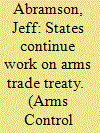| Srl | Item |
| 1 |
ID:
193508


|
|
|
|
|
| Summary/Abstract |
It was a fierce battle between the executive and the legislature, which it appeared that U.S. President Ronald Reagan would lose. The battle raged for months, during which both the majority of the House of Representatives and Senate voted against the President’s bill. However, as the final and decisive vote in the Senate plenum came closer, the President mastered all of his political skills and power of conviction and managed to persuade eight senators to change their minds. After the votes were counted, it turned out that fifty-two senators voted in favor of the President’s bill for the supply of the surveillance and command center planes known as the Airborne Warning and Control System—AWACS—to Saudi Arabia and forty-eight senators voted against it.1 Discussing the President’s success, scholars have raised several issues that came out of the affair. One issue was the battle between Reagan and the Jewish lobby over the right to act on what he deemed as a national security matter. Another issue was the right of the legislative branch to take an active role in the making of U.S. foreign policy, a domain the President considered as his purview. Scholars have given special attention to the President’s political skills, and the way he managed to convince senators to swing and support the bill.
|
|
|
|
|
|
|
|
|
|
|
|
|
|
|
|
| 2 |
ID:
057189


|
|
|
| 3 |
ID:
115416


|
|
|
| 4 |
ID:
151813


|
|
|
|
|
| Summary/Abstract |
The ugly rhetoric that erupted between Israeli and American leaders in 2014 epitomized the rapid deterioration of the relations between the two leaderships, if not yet the two countries, since Barack Obama became the American president and Binyamin Netanyahu the Israeli prime minister in 2009. To be sure, there have been conflicts between Israeli and American leaders in the past, yet none of them reached the level of personal rancour seen in 2014 with Israeli Defence Minister Moshe Ya’alon disparaging Secretary of State John Kerry’s peace efforts as ‘obsessive and messianic’ and ‘senior administration officials’ deriding Netanyahu as a ‘chickenshit’ and a ‘coward’. Even the much vaunted security relationship between the two states began to suffer in 2014 as the US held up shipments of Hellfire missiles to Israel during its summer 2014 war against Hamas. While a renewal of the bilateral 10-year military aid agreement was signed in 2016, and the ascension of Donald Trump to the presidency may herald an improvement in bilateral relations, it remains to be seen if the damage to the US‒Israeli relationship done in the 2014–2015 period will be overcome.
|
|
|
|
|
|
|
|
|
|
|
|
|
|
|
|
| 5 |
ID:
092631


|
|
|
|
|
| Publication |
2009.
|
| Summary/Abstract |
Scholars usually agree that the Israeli decision to attack Egypt in October 1956 was motivated by fear of an impending attack by the Egyptian army. That fear was spurred by the news of a large arms deal concluded between Egypt and Czechoslovakia in September 1955. However, Czechoslovak and Soviet reports, used here for the first time, reveal that the Egyptian army was encountering serious difficulties while trying to absorb these weapons. Newly declassified military intelligence assessments reveal that Israeli analysts maintained, even after the Czech-Egyptian arms deal, that the Egyptian army was no match to the IDF. The article goes on to explore the strategic consideration that stood behind the Israeli decision to go to war.
|
|
|
|
|
|
|
|
|
|
|
|
|
|
|
|
| 6 |
ID:
131453


|
|
|
|
|
| Publication |
2013.
|
| Summary/Abstract |
By the time of Richard Nixon's arrival in office Iran had already become America's single largest arms purchaser. This was the result of an evolutionary process that had been underway for two decades. Nixon did not just change that evolutionary pattern of arms sales with Iran, he completely revised U.S. thinking on Iran's regional role. By the end of his first term in office, Nixon had leveraged U.S. Middle Eastern regional policy primarily around the focal point of a militarily strong, pro-U.S. Iran. In concert, the shah was encouraged to begin an unprecedented military spending spree. Consequently, in mid-1972 following a meeting of the two leaders in Tehran, Iranian annual purchases went, virtually overnight, from being measured in the tens of millions to being measured in the multi-billions. Tracing the complex evolution toward that meeting, and the accompanying policy shifts, form an underappreciated part of Cold War history.
|
|
|
|
|
|
|
|
|
|
|
|
|
|
|
|
| 7 |
ID:
107370


|
|
|
|
|
| Publication |
2011.
|
| Summary/Abstract |
In a recent meeting that many governments and nongovernmental organizations called a success, states grappled with some of the issues that lie at the heart of the effort to create a legally binding arms trade treaty (ATT).
|
|
|
|
|
|
|
|
|
|
|
|
|
|
|
|